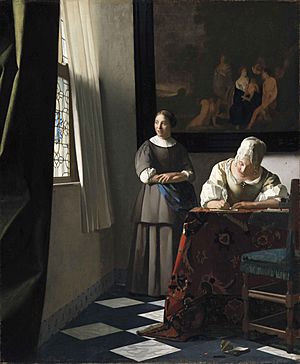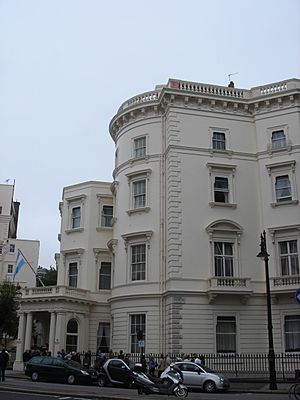Sir Alfred Beit, 2nd Baronet facts for kids
Quick facts for kids
Alfred Beit
|
|
|---|---|
| Born | 19 January 1903 London, England
|
| Died | 12 May 1994 (aged 91) Dublin, Ireland
|
| Occupation | Art collector Politician |
| Parent(s) | Otto Beit (father) |
| Relatives | Alfred Beit (uncle) |
Sir Alfred Lane Beit, 2nd Baronet (born January 19, 1903, in London; died May 12, 1994, in Dublin) was a British politician. He was also a famous art collector and a generous giver to good causes, known as a philanthropist. Later in his life, he became an honorary Irish citizen.
Contents
Alfred Beit's Early Life and Family
Alfred Beit was named after his uncle, who was a very rich mining businessman in South Africa. Alfred was born in London on January 19, 1903.
His father, Otto Beit, received a special honor in 1920 and became a "baronet" in 1924. A baronet is a person who has a special title, like a knight, that can be passed down in their family. When his father passed away in 1930, Alfred inherited a huge amount of money. He also received many valuable artworks. These included paintings by famous artists like Goya, Vermeer, Rubens, and Gainsborough.
Alfred first lived at 49 Belgrave Square in London. Later, he bought a grand house on Kensington Palace Gardens. This was one of the most exclusive streets in London. He displayed his amazing art collection there.
The Beit family was also known for their generosity. By 1930, they had given a lot of money to important places. These included the Imperial College and the Rhodes Trust. They also set up the Beit Memorial Fellowship for Medical Research. This helped people who were studying medicine. They made many other smaller donations too.
A Career in Politics
After his father died in 1930, Alfred became known as Sir Alfred Beit. He was elected as a Conservative Member of Parliament (MP) for St Pancras South East. An MP is a person elected to represent their area in the country's government. He won elections in 1931 and again in 1935.
When World War II began, he joined the Royal Air Force. He served in the Bomber Command unit. In 1944, he became a special assistant to the Colonial Secretary, who was in charge of Britain's colonies.
Sir Alfred lost his seat in the 1945 election. He became disappointed with British politics. He also strongly disagreed with the new Labour government. Because of this, he and his wife moved to South Africa. However, they were very upset by the unfair system called apartheid that developed there after 1948. This system treated people differently based on their race. Because they didn't like this, they soon returned to the UK.
Alfred's Family Life
In April 1939, Alfred married Clementine Mabell Kitty Freeman-Mitford. She was born on October 22, 1915. Clementine was related to the famous Mitford sisters. Her cousin, Clementine Churchill, was married to Winston Churchill, who became Prime Minister during World War II.
Clementine's mother spent a lot of time in Africa. Because of this, Clementine and her sister often stayed with their cousins. Clementine even went to Berlin to learn German. There, she met Hitler through her cousin. The Beits had Jewish family origins. This meant that any brief connection Clementine had with fascism did not last.
Alfred and Clementine Beit did not have any children.
Later Life in Ireland

In 1952, Alfred Beit bought Russborough House in County Wicklow, Ireland. He had admired the house for a long time. He even had a fireplace from Russborough copied for his London home in the 1930s. He moved his large art collection to Russborough.
The Beits continued to visit Africa in the 1950s. Since they had no children, they used their money to help others. They paid for schools, libraries, and health clinics in countries like Zimbabwe, Malawi, and Botswana. However, by the late 1970s, they were sad that some of these improvements were not kept up by the new governments in those countries.
Living a quiet life in Ireland, their main interests were supporting the fine arts and the Wexford Festival Opera.
Art Thefts at Russborough House
Russborough House, with its valuable art collection, became a target for thieves several times.
1974 Robbery
In 1974, a group broke into Russborough House. They stole nineteen paintings, including works by Goya, Vermeer, and Gainsborough. The stolen paintings were worth a lot of money, more than 8 million Irish pounds. During the robbery, the Beits were hurt and tied up. The thieves wanted to trade the paintings for the release of some members of a group called the IRA. All the stolen paintings were found a few weeks later in County Cork.
1986 Robbery
In 1986, the house was robbed again. This time, a criminal named Martin Cahill and his gang stole 18 paintings. These were valued at 30 million Irish pounds. All but two of these paintings were found later by police in different countries.
Later Robberies
In 2001, two more paintings were stolen in another robbery. Both were found in 2002. In 2002, another robbery took five paintings, including two by Rubens.
Because of these repeated thefts, the special art collection had to be moved to Dublin for safety. This made Russborough House less appealing to tourists.
A Great Gift to Ireland
In 1993, Alfred Beit was made an honorary Irish citizen. This was to thank him for his generosity. In 1987, he had given seventeen masterpieces to the National Gallery of Ireland. These paintings were estimated to be worth between 50 million and 100 million Irish pounds. The gallery called this gift "among the greatest single gift to any Gallery in the world in that generation." A part of the National Gallery on Merrion Square is named the Beit Wing in honor of Alfred and Clementine Beit. They also served on the gallery's board of directors.
When his wife Clementine passed away in 2005, her will said that Alfred Beit's diaries should be kept secret for a long time. This led to some talk in the media. However, it is also common for families like theirs to set a future date for such things. Sir Alfred and Lady Beit are both buried in Blessington, County Wicklow.
The Alfred Beit Foundation
The good work of the Beits continues today through the Alfred Beit Foundation. This organization was started in 1976 and is based at Russborough House. In 2006, the Foundation sold some old Italian bronze statues for 2 million pounds. This money was used to help pay for ongoing repairs at Russborough.
 | Toni Morrison |
 | Barack Obama |
 | Martin Luther King Jr. |
 | Ralph Bunche |


